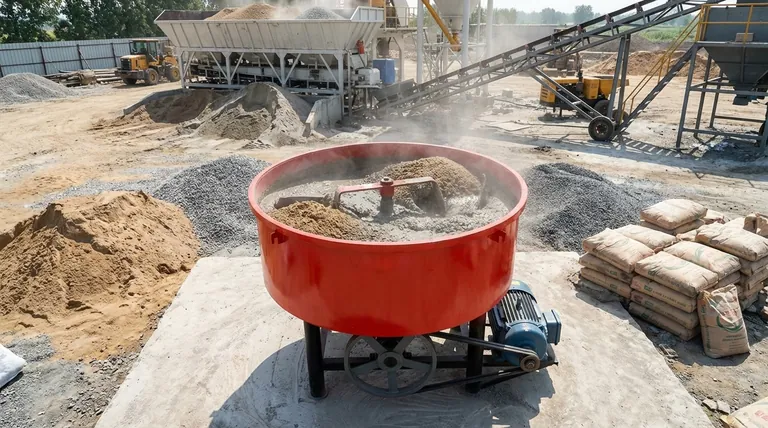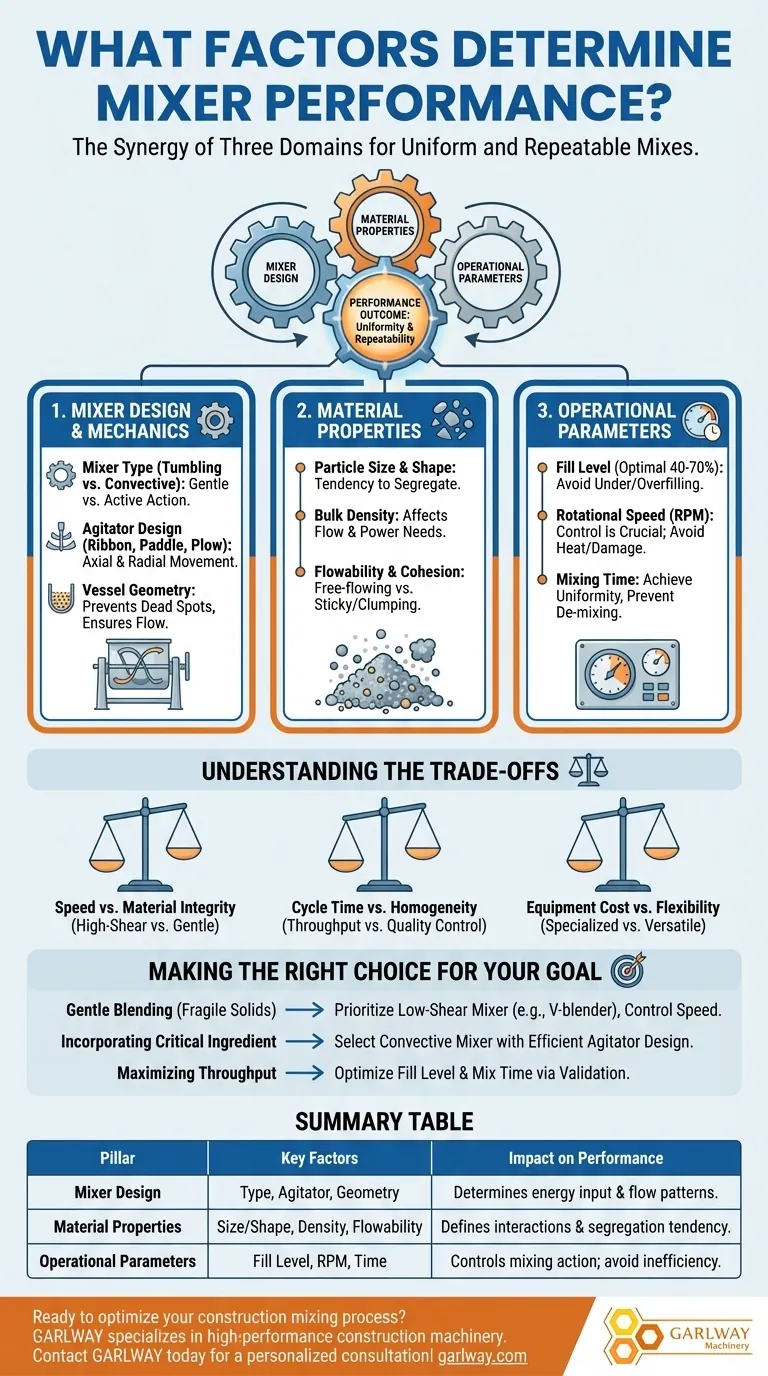At its core, mixer performance is determined by the interplay between the mixer's mechanical design, the physical properties of the materials being mixed, and the operational parameters used during the process. Achieving a uniform and repeatable mix depends entirely on how well these three domains are aligned for a specific application.
A mixer's performance is not a single specification but an outcome. It emerges from the synergy between the right equipment, a deep understanding of the ingredients, and a precisely controlled process.

The Three Pillars of Mixer Performance
To truly grasp what drives performance, we must look at the system as a whole. It’s a mistake to focus only on the machine itself. The three critical pillars are the mixer's design, the material's characteristics, and the process parameters.
Pillar 1: Mixer Design and Mechanics
The physical equipment is the foundation. Its design dictates how energy is imparted to the materials to induce flow and inter-particle movement.
Mixer Type The most fundamental factor is the mixer's category. Tumbling mixers (like V-blenders) are gentle and suited for free-flowing powders, while convective mixers (like ribbon or paddle blenders) use agitators to actively move material and are more versatile.
Agitator Design The shape and action of the mixing element—be it a ribbon, paddle, or plow—are critical. A ribbon agitator is designed to move material both axially and radially, making it highly efficient for many powders.
Vessel Geometry The shape of the mixing vessel influences material flow. Poor geometry can create "dead spots" where material remains static, leading to a non-uniform final product.
Pillar 2: Material Properties
You cannot evaluate a mixer without considering what it is mixing. The same machine will perform differently with different materials.
Particle Size and Shape Materials with vastly different particle sizes or shapes have a natural tendency to segregate. A well-designed mixer must impart enough energy to overcome this tendency.
Bulk Density The density of the material impacts how it flows and how much power is required to move it. Mixing materials with significant density differences presents a major challenge.
Flowability and Cohesion Free-flowing materials like dry sand are easy to mix. Cohesive or sticky materials, however, require a mixer that can apply enough shear force to break apart clumps and ensure proper distribution.
Pillar 3: Operational Parameters
How you operate the mixer is just as important as its design. The best mixer in the world will perform poorly if used incorrectly.
Fill Level Every mixer has an optimal working volume, typically between 40-70% of its total capacity. Underfilling prevents proper material interaction, while overfilling restricts particle mobility and drastically reduces efficiency.
Rotational Speed (RPM) The speed of the agitator must be carefully controlled. Too slow, and the mixing action is ineffective. Too fast, and you can introduce excess heat, damage particles, or even cause certain materials to segregate.
Mixing Time Mixing time is an outcome, not just an input. The goal is to identify the point at which uniformity is achieved without wasting energy or risking de-mixing.
Understanding the Trade-offs
Optimizing for one performance metric often means compromising on another. Understanding these balances is key to selecting the right process.
Speed vs. Material Integrity
High-shear mixers can achieve a uniform blend very quickly. However, that same high-energy action can damage or break down fragile or friable materials, altering the final product's characteristics.
Cycle Time vs. Homogeneity
The pressure to increase throughput often leads to shorter mixing times. This can be a false economy if it results in batches that fail quality control because they haven't reached a state of true, repeatable uniformity.
Equipment Cost vs. Flexibility
A highly specialized mixer may perform one specific task perfectly. However, a more versatile (and often more expensive) machine might be a better long-term investment if your production needs are expected to change.
Making the Right Choice for Your Goal
Your specific objective dictates which performance factors to prioritize.
- If your primary focus is gentle blending of fragile solids: Prioritize a low-shear mixer type, such as a V-blender or tumble mixer, and carefully control rotational speed.
- If your primary focus is incorporating small amounts of a critical ingredient: Select a convective mixer with an efficient agitator design that ensures rapid and complete distribution.
- If your primary focus is maximizing throughput: Concentrate on optimizing fill level and mix time through validation studies to ensure you are not over-mixing.
Ultimately, mastering your mixing process comes from understanding that the machine, material, and method are inseparable parts of a single system.
Summary Table:
| Pillar | Key Factors | Impact on Performance |
|---|---|---|
| Mixer Design | Mixer Type, Agitator Design, Vessel Geometry | Determines energy input and flow patterns, critical for avoiding dead spots. |
| Material Properties | Particle Size/Shape, Bulk Density, Flowability | Defines how materials interact and their tendency to segregate or clump. |
| Operational Parameters | Fill Level, Rotational Speed (RPM), Mixing Time | Controls the mixing action; incorrect settings can lead to inefficiency or product damage. |
Ready to optimize your construction mixing process? GARLWAY specializes in high-performance construction machinery, including robust concrete mixers and batching plants designed for contractors and construction companies worldwide. Our experts can help you select the right equipment to achieve perfect, uniform blends every time, boosting your project's efficiency and quality. Contact GARLWAY today for a personalized consultation!
Visual Guide

Related Products
- Commercial Construction Mixer Machine for Soil Cement Mixing Concrete
- Auto Concrete Cement Mixer Machine New
- Portable Ready Mix Concrete Mixer Equipment
- JDC350 Small Cement Concrete Mortar Mixer
- HZS90 Large Multiquip Concrete Mixers for Construction
People Also Ask
- What is the primary function of a concrete mixer? Ensure Uniform Strength & Durability
- What is the purpose of concrete mixers in construction? Ensure Quality, Efficiency & Durability
- What is a good size concrete mixer for small projects? Find the Perfect 3-5 Cu Ft Mixer for Your Job
- What is a concrete mixer used for? Achieve Consistent, High-Quality Concrete
- What maintenance practices extend a concrete mixer's lifespan? A Proactive Guide to Maximize Equipment Life



















